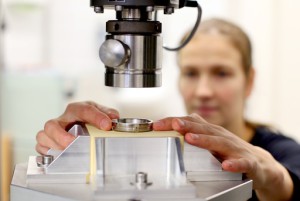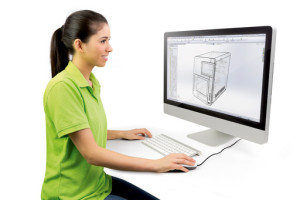 Medical Area at the METAV 2016-International Exhibition for Metalworking Technologies will showcase the new trend towards personalised medical technology is elucidated by experts from the academic community and the industrial sector. The exhibition will be held from 23 to 27 February 2016, in Düsseldorf.
Medical Area at the METAV 2016-International Exhibition for Metalworking Technologies will showcase the new trend towards personalised medical technology is elucidated by experts from the academic community and the industrial sector. The exhibition will be held from 23 to 27 February 2016, in Düsseldorf.
Personalisation is a major hands-on focus at the Research Laboratory for Biomechanics and Implant Technology (FORBIOMIT) at Rostock University’s Medical Faculty. “The boundary conditions are highly disparate from patient to patient,” explains Prof. Dr. med. habil. Dipl.-Ing. Rainer Bader, the research laboratory’s director, regarding the use of implants in orthopaedic surgery. “Before any individualised implants are actually manufactured, numerical simulations should be run, in order to check how stress-resistant the implant is going to be.” There is still a lack of standardised human models that cover the entire gamut of individual patients, and are thus well suited for personalised medical technology.
This is the principal thrust of the research work in Rostock, where (rather like in industrial applications) what are called hardware-in-the-loop (HIL) simulations are run for hip and knee endoprostheses. These image the interaction (in-the-loop) of a robot (hardware) with the numerical multi-body model of the lower extremity.
For four years now, the Fraunhofer Institute for Machine Tools and Forming Technology (IWU) has been researching and developing the field of medical technology at its facilities in Chemnitz and Dresden. Besides additive processes, like laser beam melting, the institute is focusing not only on a batch size of one, but also on the “unconventional” composite materials. “These include materials with an integrated functional material,” explains the institute’s director, Dr.-Ing. Welf-Guntram Drossel, who heads the Mechatronics and Functional Lightweight Construction Department. “We integrate a shape memory element into an implant, for example, so as to obtain a force-homogenised contact pressure on the bone. It adapts automatically and actively to altered conditions, and is thus a combined constructional/functional material. Which means we have created a fit-for-purpose synthesis of technology and material.”
Personalised medical technology is the exclusive focus at Datron AG from Mühltal near Darmstadt, which develops individually customised machining centres for dental technicians and dentists. To quote Frank Fuchs, Product Manager Dental CAD/CAM Systems: “The challenge we face is to develop machines that are matched to both the different materials encountered and to the dental customers involved, most of whom possess no knowledge whatsoever of programming and machining.” Since production lines for the field of dentistry machine materials like plastics, zirconium oxides or titanium, they need individualised machining processes with different cutting tools. Moreover, the range of applications for present-day dental machines has been widened. To quote Frank Fuchs: “Meanwhile we also have customers, for example, who buy a dental machine for manufacturing bone implants. Here, in turn, we’re dealing with totally different materials.”


